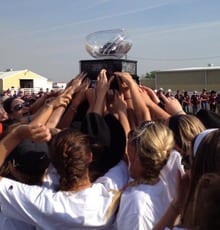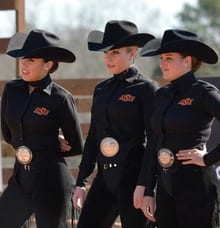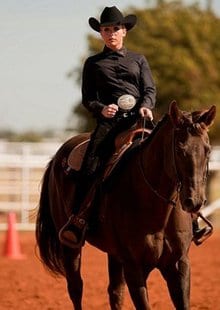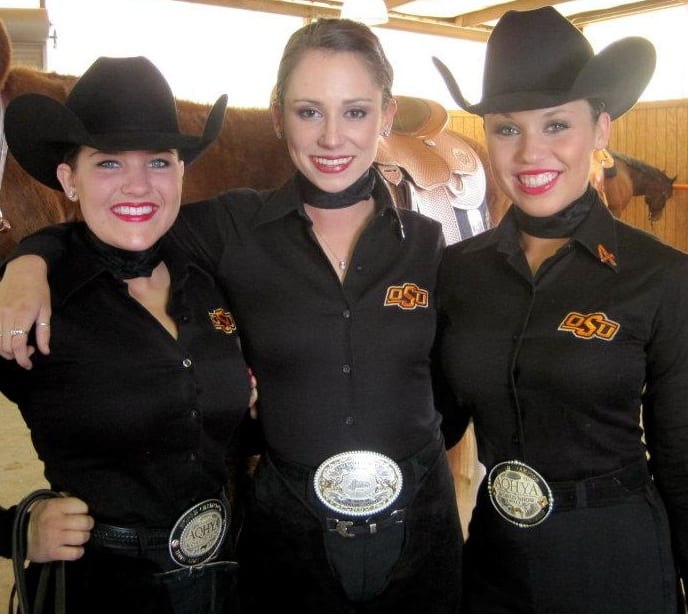With the National Collegiate Equestrian Association’s National Championships upon us April 12-14 in Waco, Texas, GoHorseShow wanted to find out more about NCAA Equestrian team recruiting rules.
Do you know when a prospective student-athlete can contact a coach? Do you know when a coach can contact a potential recruit? When a student can go for an official visit? Signing days? GPA requirements? We have discovered, it is a challenge to keep up with all the rules
and deadlines.
Hoping to clear up the confusion, GoHorseShow sat down with Oklahoma State University Equestrian Head Coach, Larry Sanchez to find out the rules and deadlines for prospective student-athletes (PSAs) wanting to ride for an equestrian team. Sanchez says that there are many high school students who are still unaware of the rules.
“Last fall I had a senior in high school send me her information, but by that time, it was already too late,” Sanchez says. “I told her that we had already signed all the girls for this year, and she said that she was told that she couldn’t talk to me until her senior year–which is not correct. I hate to miss out on a talented rider because they are not aware of the rules.”
 The NCAA considers a student a PSA when she starts classes in the ninth grade, this is when the recruiting rules go into effect.
The NCAA considers a student a PSA when she starts classes in the ninth grade, this is when the recruiting rules go into effect.
Following are a few of the rules that you need to be aware of:
1) Coaches are not allowed to respond to emails from the prospect until the prospect’s junior year.
2) Coaches are not allowed to make phone calls to a student until July 1st following their junior year in high school.
3) The prospective student can email or call the coach before then, but they need to be aware they may not get a response, and that does not necessarily mean that the coach is not interested.
4) When it is legal for coaches to call, they are limited to only one phone call per week to this potential student, but the student is allowed to call the coach as often as they want.
5) Coaches are also not allowed to text a student until they have signed a letter of intent. (Pictured above–OSU Cowgirls winning the 2012 Big 12 Championship)
There are some exceptions to the rules. For the five days before their official visit, the coach may talk to the student an unlimited number of times in order to make plans and organize the trip. Coaches may also make unrestricted calls to their potential student-athlete the five days before signing the letter of intent. PSAs can only sign their senior year of high school during the NLI signing period and most athletes are signed during the early period of November.
There are also two types of visits to a university: official and unofficial visits. A student can go on as many unofficial visits as they would like but the cost comes out of the student’s pocket. According to NCAA rules, a student may take up to five official visits once they start classes their senior year in high school.
 “During their official visit, for 48 hours, we can pay for meals, hotels, take them to ball games, and show them around the campus. It is also a time for us to get to know the student and see if they will work in our program,” Sanchez says. “I encourage the students to go on as many visits as they can. They need to feel at home wherever they decide to go.”
“During their official visit, for 48 hours, we can pay for meals, hotels, take them to ball games, and show them around the campus. It is also a time for us to get to know the student and see if they will work in our program,” Sanchez says. “I encourage the students to go on as many visits as they can. They need to feel at home wherever they decide to go.”
The NCAA allows the equivalent of 15 full-ride equestrian scholarships, but, Sanchez says he usually splits the scholarships up and gives them to several girls. Last year, he gave 38 girls partial scholarships. Sanchez says that everyone needs to know that there are two types of student athletes: scholarship athletes and walk-ons. Scholarship athletes receive a full or partial athletic scholarship whereas walk-ons are student athletes that make the team but do not receive scholarship money.
“I have never given a full ride to one student as one girl equals one point for our team,” Sanchez explains. “It makes more sense for us to try and spread it out and help as many girls as possible which in turn hopefully helps the team. Some universities may give full rides; it all depends on what they might need or whether they think that person is really worth it.”
 During the recruiting period, Sanchez says that he usually starts with over 300 videos and separates them into the Hunt Seat and Western. For the sake of clarity, we will be discussing the western events (reining and horsemanship) in this article. With the 150 or so western videos, Sanchez says, he then narrows them down to three stacks: really good, has potential, and need more work. Then, Sanchez says he narrows it down to around eight to ten athletes that he will try and recruit to his western team. Students usually send their videos their junior year—if you send it your senior year–it may be too late! Sanchez will then travel and watch these PSAs ride and show. He will also ask people about the rider–whether they are team players, easy to get along with, can ride different types of horses, etc. Then, he usually reduces it down to five or six horsemanship and reining students to come for official visits.
During the recruiting period, Sanchez says that he usually starts with over 300 videos and separates them into the Hunt Seat and Western. For the sake of clarity, we will be discussing the western events (reining and horsemanship) in this article. With the 150 or so western videos, Sanchez says, he then narrows them down to three stacks: really good, has potential, and need more work. Then, Sanchez says he narrows it down to around eight to ten athletes that he will try and recruit to his western team. Students usually send their videos their junior year—if you send it your senior year–it may be too late! Sanchez will then travel and watch these PSAs ride and show. He will also ask people about the rider–whether they are team players, easy to get along with, can ride different types of horses, etc. Then, he usually reduces it down to five or six horsemanship and reining students to come for official visits.
“The potential recruits need to be able to ride different horses; be able to adapt to different instruction; and be open to learning methods they may not be used to,” Sanchez says. “They also must maintain a 2.5 GPA at OSU in order to be able to remain eligible to compete on the team. It is also a must for the student to have already taken the SAT or ACT their junior year prior to their official visit their senior year to the university. Also, if there are two potential recruits that are about equal; I will always take the student with the higher GPA. So academics is very important when shooting for a scholarship.”
There are more detailed rules the PSA needs to know about the recruiting process, such as dead periods, quiet period, and contact periods. Find out more information by visiting the NCAA website: www.ncaa.org. Sanchez also mentions that each potential recruit needs to visit www.collegiateequestrian.com and contact the university they may want to attend and find out their specific rules and qualifications.
If a student has questions, and it is before the time the coach can legally contact a potential recruit, they can contact the compliance officer in the athletic department at a particular institution for more information.








